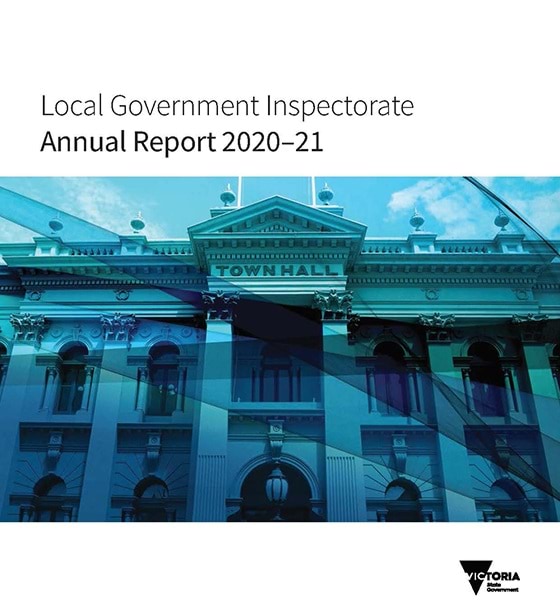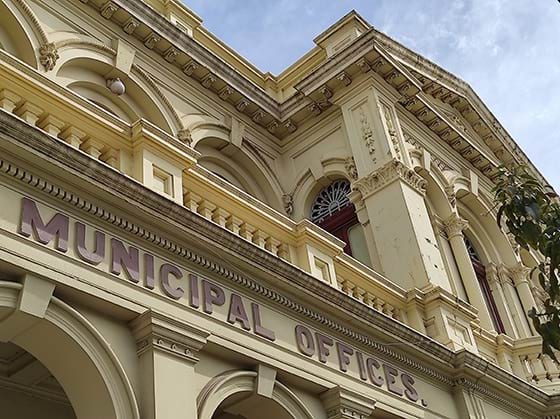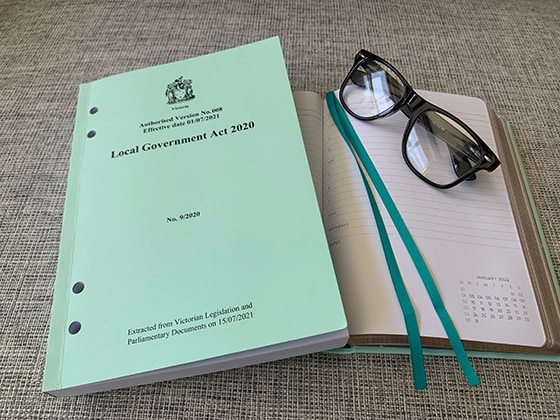- Date:
- 8 Feb 2022
Chief Municipal Inspector's message
Welcome to the Summer 2021-22 edition of our Integrity Matters newsletter.
It seems that 2022 has started under the same uncertainty and ever-changing conditions that we lived through in 2020 and 2021 due to the pandemic. However, I hope you found some time to recharge, relax and enjoy the company of family and friends over the Christmas and New Year period.
In this newsletter, we look at the topic of councillor conduct and who has the responsibility for dealing with poor behaviour. We often receive complaints about conduct issues that we are not able to investigate because councils must deal with code of conduct matters.
In December we released our 2020-21 Annual Report(opens in a new window). The report charts a sharp rise in complaints – largely driven by an increase in complaints during the 2020 council elections. We are also pleased to launch a new resources section for councils on our website. We have fact sheets, summaries of our reports and best-practice council policies available. We hope these tools will help councils improve their compliance with the Local Government Act.
Meanwhile, the "new Act" is not so new and the transition period for councils to move to the 2020 Act has ended. Councils should have a number of policies in place as the deadline for these policies has now passed.
And finally, I ask you to add your voice to a project to improve the culture in local government in Victoria. Consultation on Local Government Victoria’s project ends on 28 February and aims to improve public trust in the sector.
Michael Stefanovic AM
Chief Municipal Inspector
Councillor conduct issues: who deals with poor behaviour, councils or the Inspectorate?
Swearing during public meetings, disagreements between councillors, and abusive or disrespectful comments by councillors to residents on social media are some of the complaints we receive about councillor behaviour. However, the Inspectorate is only able to investigate or refer the most serious behaviour issues.
What we are able to investigate is set out in the Local Government Act 2020(opens in a new window). The Act and accompanying regulations also sets out the standard of behaviour expected for councillors. The Act – with some exceptions – provides councils with the means for dealing with these matters internally.
Only the council (upon resolution), a councillor or group of councillors can take action against another councillor for breach of the standards set out in the Act.
Councils are required to implement a code of conduct for councillors which sets out the standards of behaviour expected. Examples of possible code of conduct breaches include:
- disagreements between councillors
- standards of conduct
- inappropriate behaviour
- bringing the council into disrepute.
The code of conduct should also set out the procedures for dealing with conduct complaints. The first step to resolve a complaint generally includes informal meetings and internal arbitration is usually a costly last resort.
Chief Municipal Inspector Michael Stefanovic AM said:
“A member of the public must contact their council, their ward councillor or the mayor to raise concerns about conduct by councillors.
“Likewise, a councillor needs to resolve such issues with another councillor internally rather than complaining to the Inspectorate. Although councillors may want to avoid conflict by involving the Inspectorate – our powers are limited.”
The Inspectorate is not able to investigate simple misconduct by councillors. We cannot investigate issues such as swearing during council meetings, disagreements between councillors or bringing the council into disrepute (such as damaging the council’s reputation by making false comments about the council or its work on social media).
All of these matters are possible breaches under the council’s code of conduct and must be dealt with by the council.
However, the Act states that the Chief Municipal Inspector does have powers to investigate serious and gross misconduct. Examples of serious misconduct are:
- failing to disclose a conflict of interest
- disclosure of confidential information
- directing council staff.
Case studies
An internal arbiter at a western suburbs council ruled last November that a councillor had breached the council’s code of conduct for disrespectful and misleading comments. The matter was referred to arbitration after the councillor implied that a colleague had a conflict of interest over a budget item during a radio interview. This was resolved in the correct manner, without involving the Inspectorate, and the councillor apologised for their comments.
At a western regional council last December, an independent arbiter found that a councillor had breached the Local Government (Governance and Integrity) Regulations 2020(opens in a new window) over their critical and derogatory comments to other councillors relating to the mayoral voting process. The councillor was required to make a written apology as stipulated by the arbiter.
Election drives complaint rise in 2020-21
A sharp rise in complaints during 2020-21 was revealed in our latest annual report, released in December. Our 2020-21 Annual Report outlines our work to strengthen the integrity, accountability and transparency of local government in Victoria during the last financial year.
During 2020-21, we assessed 1164 complaints and completed 51 investigations. The increase in complaints was due to the 848 complaints during general council elections. In the 2016-17, reporting period, which covered the 2016 elections, we assessed 576 complaints.
During 2020-21, our office:
- issued 139 warnings in relation to the council elections
- issued 25 warnings on non-election matters
- used coercive powers on 50 occasions to obtain documents or interview people
- interviewed 28 individuals – with most being done voluntarily.
Chief Municipal Inspector Michael Stefanovic AM said COVID-19 and COVIDSafe work practices continued to challenge the Inspectorate.
“The restrictions on movement forced the cancellation of planned face-to-face interviews and restricted our ability to visit councils and conduct legal proceedings.”
The report includes case studies of some of the work we completed during 2020-21.
You can read the full report on our website.
New resources now available for councils
The Inspectorate has created new resources to help councils improve compliance with the Local Government Act 2020(opens in a new window). The new resources for councils section on our website and groups together practical advice for councils, councillors and governance staff.
Recent feedback from council governance staff, CEOs and councillors – during informal discussions, at council briefings and through our online survey – has called for clear guidance and information.
Our advice and information is in addition to the guidance material being provided or in development by Local Government Victoria. It is based on information we have received during the course of our investigations and examinations.
Resources available includes:
- fact sheets
- report summaries
- case studies
- best practice council policies
- trends in examination trends.
We aim to increase the number of materials in the coming months. If you have any suggestions for additional resources, please get in touch.
Council policy deadline passes
Victorian councils should now have completed or updated a number of key policies, in accordance with the Local Government Act 2020(opens in a new window).
The Act required councils to produce a number of policies and councils were given time to allow for the transition to the new act.
However, councils should now have finalised a number of policies. The Act required that the following policies were finalised by 31 December 2021:
- CEO employment and remuneration Policy
- Workforce Plan
- Recruitment Policy
- Staff Code of Conduct
- Complaints Policy
- Procurement Policy
Meanwhile, Victorian councils should have published their Annual Reports on 30 November.
In addition, the following documents should have been completed by 31 October 2021:
- Financial Plan
- Council Plan
- Community Vision.
More information is available on the Local Government Victoria website(opens in a new window).
Comments sought on culture in local government
Local Government Victoria is seeking input on a major project designed at improving culture in local government. The Local Government Culture Project aims to understand the factors influencing culture and conduct within local government and identify opportunities and initiatives the sector can implement to improve culture and conduct.
A discussion paper on the project states that while most councillors behave in a professional manner, there have been many cases of poor councillor behaviour in recent years. Between 2016 and 2020, the Victorian Government had to become involved with four anti-corruption investigations and five councils being dismissed.
Poor councillor behaviour can take different forms and includes bullying and harassment, sexual harassment, discrimination and corruption. The impact of this behaviour includes:
- affecting the health and wellbeing of those subject of the poor behaviour
- creating a toxic work culture – making it difficult for councils to attract staff
- impacting the ability of a council to perform its rule
- financial costs to council
- damaging a council’s reputation.
Chief Municipal Inspector Michael Stefanovic AM said:
“It is vital for democracy that local governments reflect the communities they serve. Behaviour such as bullying or sexual harassment can stop good candidates standing for election.
“Poor councillor behaviour can affect the cohesiveness of a council group and lead to issues such as councillors voting in blocks, making vexatious complaints to authorities or the inability for a council to make decisions in the community’s best interests.
“Many complainants have contacted us over the years with the mistaken impression that the Inspectorate can sort out issues of poor councillor behaviour. However, it is the responsibility of mayors and councillors to improve the culture of councils.”
The Local Government Culture Project aims to provide a platform for the local government sector to identify and take ownership of a positive and inclusive culture that will improve governance and build public trust.
Comments on the Discussion Paper can be made until 5pm Monday 28 February 2022.





